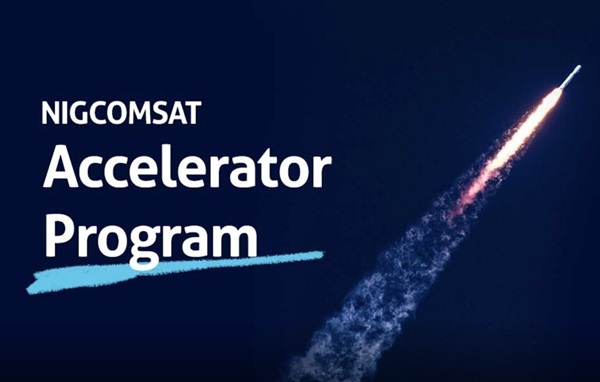
Nigeria is stepping up its ambition to harness space technology as a catalyst for economic growth, security, and digital innovation, with the launch of the ‘NIGCOMSAT Accelerator Programme 2.0’ in Abuja.
The initiative, themed ‘Innovation in Orbit: Empowering the Next Generation of Space-Tech Entrepreneurs,’ aims to nurture a dynamic ecosystem of local startups, engineers, and innovators who will shape Nigeria’s future in the global space economy.
Speaking at the launch, the managing director of Nigerian Communications Satellite (NIGCOMSAT) Limited, Jane Egerton-Idehen described the programme as a strategic move to shift Nigeria and Africa from passive consumers of space technology to active producers and innovators. She stressed that Nigeria has already demonstrated capacity in the space sector through investments in communication satellites and remote sensing but must now channel its talent and entrepreneurial spirit into developing scalable, homegrown solutions.
She stated that the theme of this year’s Accelerator Programme reflects a bold shift from dependence to creativity. “Space is no longer a distant frontier for only a few. Today, space-tech is an engine for solving real problems – from precision agriculture and environmental monitoring to disaster management, national security, fintech and connectivity,” she said.
The NIGCOMSAT Accelerator Programme, according to Egerton-Idehen, will provide early-stage space-tech ventures with tailored incubation, mentorship, access to strategic partnerships, and platforms to pilot solutions addressing critical national priorities. She acknowledged the high failure rate of startups, noting that one in three fails within the first five years but expressed confidence that with the right support, Nigerian startups can beat the odds.
She highlighted that the global space economy is projected to hit $1 trillion, positioning Nigeria to lead the African drive by investing in talent, ideas, and systems that turn potential into innovation. She urged stakeholders to collaborate to make Nigeria’s space-tech ecosystem robust, inclusive and innovation-driven.
The event attracted high-level endorsements from security and technology leaders. Representing the Chief of Defence Staff, Gen. Christopher Musa, AVM Nkem Vincent Aguiyi described the launch as a milestone in Nigeria’s quest to become a hub for technological development and economic diversification. He emphasised the Defence Headquarters’ recognition of space technology’s role in satellite-enabled surveillance, secure communications, and AI-driven threat detection, calling for sustained support to nurture local solutions and empower young innovators.
Inspector-General of Police, Kayode Egbetokun, represented by the force’s communications officer, Hammed Sule lauded NIGCOMSAT for driving indigenous innovation. He noted that robust satellite communication enhances the Police Force’s capabilities in surveillance, real-time communication, and emergency response. Egbetokun reaffirmed the Police’s commitment to supporting Nigeria’s journey in space communications and digital resilience.
Representative of Mallam Kashifu Abdullahi, the director-general of the National Information Technology Development Agency (NITDA), Abdullahi Aluyi, noted that NITDA is building an environment that allows the IT sector to flourish. He emphasised that the Startup Act and over ₦10 billion in investments will help address funding barriers for startups, encouraging partnerships with angel investors and venture capitalists. Aluyi stressed that the programme will enable startups to build solutions that align with government needs, create jobs, and advance President Tinubu’s entrepreneurship agenda.
An assistant professor with the National Space Research and Development Agency (NASRDA), Dr. Innocent Bello, reinforced the crucial role of technology in addressing Nigeria’s economic and security challenges. He noted that the upcoming launch of four new satellites, including a synthetic aperture radar satellite, will enhance data gathering for diverse applications like precision farming and weather forecasting. Bello argued that satellite-enabled precision agriculture can revolutionise Nigeria’s food security and empower farmers with better data for planting and harvest planning.
Founder of Pasby, Confidence Jack-May, one of the startups in the programme, shared how space-tech and data systems can tackle fraud and identity theft. Pasby, he explained, will allow Nigerians to access services using information already captured in the national registry, removing repetitive KYC hurdles and reducing scams. He added that by building trust, Pasby will create new opportunities for other startups to grow within a secure digital ecosystem.
Across various speakers, a recurring message resonated: Nigeria must not be left behind in the unfolding global space-tech boom. From defence and policing to agriculture and digital finance, the country’s future prosperity depends on how quickly it can translate talent, research and local challenges into practical, innovative solutions.
Closing the launch, Egerton-Idehen reiterated NIGCOMSAT’s commitment to building a bold generation of entrepreneurs who see space not as an unreachable frontier but as the next economic opportunity. She called on government agencies, private investors, academia and industry players to work together to accelerate Nigeria’s emergence as a leader in space-driven national development.
With programmes like the ‘NIGCOMSAT Accelerator 2.0,’ the country takes another confident step towards transforming its aspirations into reality, unlocking not just the mysteries of space but practical solutions that power economic growth, job creation and technological leadership for years to come.

